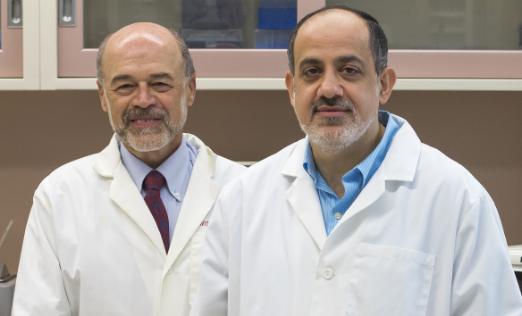Start of something good
Massey’s Pilot Research Grant Program sets the groundwork for the next big discovery
By Brelyn Powell
After years of studying chemotherapeutic drugs and radiation, David Gewirtz, Ph.D., a member of Massey Cancer Center’s developmental therapeutics research team, knew that efforts to address the toxicity of the drugs and their painful side effects were sorely needed.
In 2013, he recruited his research partner, M. Imad Damaj, Ph.D., a researcher in cancer prevention and control with extensive experience in the uses and effects of nicotine.
Together, they decided to test nicotine receptors in the central nervous system as potential agents for the suppression of chemotherapy-induced peripheral neuropathy, a combination of numbness, tingling and burning sensations, as well as discomfort from otherwise routine contact, that is common for cancer patients undergoing treatment.
“People in Dr. Damaj’s field have known for years that nicotine can mitigate certain kinds of pain, but the cancer community was unaware of that,” Gewirtz says. “When painful side effects like CIPN appear, clinicians often have to terminate the treatment before it is completed, which can be detrimental to the patient.”
Using data produced in Damaj’s laboratory, Gewirtz and Damaj developed a proposal for funding from Massey’s Pilot Research Grant Program to support their efforts.
The pilot program provides startup dollars for researchers to gather initial data to support innovative research initiatives. As part of Massey’s commitment to encourage collaboration in cancer research, the pilot program requires any project to involve at least two independent investigators from different research disciplines. This requirement encourages investigators with complementary areas of expertise to come together to explore how their findings will impact the cancer community as a whole.
Gewirtz and Damaj’s proposal earned them an award of $50,000 to produce the initial data they needed to apply for a research project grant from the National Institutes of Health.
This year, they received a grant of $1.7 million to continue their efforts.
“The pilot project grant did more than just fund our preliminary research,” Damaj says. “It allowed us to connect with many clinicians who treat patients with this side effect every day and work with them to figure out how we could develop our data and translate it into possible treatment trials.”
Since 2012, philanthropic and state funds have been the primary sources of funding for Massey’s Pilot Research Grant Program. In that time, $1,783,216 has been awarded to fund 42 projects. That investment has generated more than $16 million in external grant funding for the cancer center.
This return on investment makes the program an appealing way for donors like Ted Chandler to direct their support.
As a member and former chairman of Massey Cancer Center’s Community Advisory Board, Chandler has witnessed firsthand the center’s dedication to groundbreaking research and is passionate about doing his part to help.
He established the Chandler Family Research Fund in 2011 with an initial pledge of $50,000 as part of the Pilot Research Grant Program.
“Like almost every family, mine has been impacted by the scourge of cancer,” Chandler says. “Knowing that my gift could catalyze Massey’s next great breakthrough is very important to us. We do a little bit, and the researchers do the rest.”
Damaj and Gewirtz are planning to extend their efforts to develop a comprehensive program that addresses other side effects of cancer and cancer treatment, such as joint pain and cognitive dysfunction. They hope their work will lead to the development of methods to treat the dose-limiting side effects of chemotherapy and radiation and improve the quality of life of cancer patients.
“It is only because of the generosity of the community that I’m able to direct funds to ensure we are pursuing the most promising and innovative concepts,” says Gordon D. Ginder, M.D., director of Massey Cancer Center and Lipman Chair in Oncology. “It’s an essential part of our mission, and return on this investment will ultimately be measured in patients living longer, healthier lives.”
To learn more about VCU Massey Cancer Center, contact Cindy Zilch, chief development officer, at (804) 828-1452 or czilch@vcu.edu.
